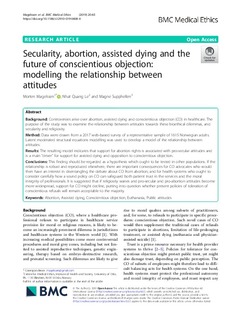| dc.contributor.author | Magelssen, Morten | |
| dc.contributor.author | Le, Nhat Quang | |
| dc.contributor.author | Supphellen, Magne | |
| dc.date.accessioned | 2019-09-26T08:00:10Z | |
| dc.date.available | 2019-09-26T08:00:10Z | |
| dc.date.created | 2019-09-19T10:13:43Z | |
| dc.date.issued | 2019 | |
| dc.identifier.issn | 1472-6939 | |
| dc.identifier.uri | http://hdl.handle.net/11250/2618877 | |
| dc.description.abstract | Background Controversies arise over abortion, assisted dying and conscientious objection (CO) in healthcare. The purpose of the study was to examine the relationship between attitudes towards these bioethical dilemmas, and secularity and religiosity. Method Data were drawn from a 2017 web-based survey of a representative sample of 1615 Norwegian adults. Latent moderated structural equations modelling was used to develop a model of the relationship between attitudes. Results The resulting model indicates that support for abortion rights is associated with pro-secular attitudes and is a main “driver” for support for assisted dying and opposition to conscientious objection. Conclusions This finding should be regarded as a hypothesis which ought to be tested in other populations. If the relationship is robust and reproduced elsewhere, there are important consequences for CO advocates who would then have an interest in disentangling the debate about CO from abortion; and for health systems who ought to consider carefully how a sound policy on CO can safeguard both patient trust in the services and the moral integrity of professionals. It is suggested that if religiosity wanes and pro-secular and pro-abortion attitudes become more widespread, support for CO might decline, putting into question whether present policies of toleration of conscientious refusals will remain acceptable to the majority. | |
| dc.description.abstract | Secularity, abortion, assisted dying and the future of conscientious objection: modelling the relationship between attitudes | |
| dc.language.iso | eng | |
| dc.relation.uri | https://doi.org/10.1186/s12910-019-0408-4 | |
| dc.title | Secularity, abortion, assisted dying and the future of conscientious objection: modelling the relationship between attitudes | |
| dc.type | Peer reviewed | |
| dc.type | Journal article | |
| dc.description.version | publishedVersion | |
| dc.source.volume | 20 | |
| dc.source.journal | BMC Medical Ethics | |
| dc.identifier.doi | 10.1186/s12910-019-0408-4 | |
| dc.identifier.cristin | 1726563 | |
| cristin.unitcode | 7572,0,0,0 | |
| cristin.unitcode | 191,20,0,0 | |
| cristin.unitname | Samfunns- og næringslivsforskning AS | |
| cristin.unitname | Institutt for strategi og ledelse | |
| cristin.ispublished | true | |
| cristin.fulltext | original | |
| cristin.qualitycode | 1 | |
